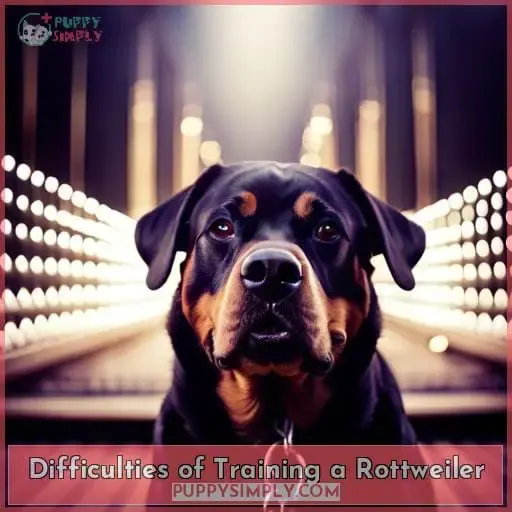This site is supported by our readers. We may earn a commission, at no cost to you, if you purchase through links.
 Curious about whether Rottweilers are easy to train? Look no further! This article is packed with training tips and tricks for these intelligent and loyal dogs.
Curious about whether Rottweilers are easy to train? Look no further! This article is packed with training tips and tricks for these intelligent and loyal dogs.
Discover why Rottweilers excel in obedience, thanks to their high intelligence and history of work. While they may have a stubborn side, the benefits of training far outweigh any challenges.
From starting young to using positive reinforcement, we’ll guide you through the process of successfully training your Rottweiler companion.
Table Of Contents
- Key Takeaways
- Rottweiler Trainability Overview
- Why Rottweilers Are Easy to Train?
- Difficulties of Training a Rottweiler
- The Good Outweighs the Bad
- Tips for Training Your Rottweiler
- Are Rottweilers Easy to House Train?
- How Do You Punish a Rottweiler?
- Key Milestones: 6–7 Weeks
- Key Milestones: 8–9 Weeks
- Key Milestones: 4 Months
- Frequently Asked Questions (FAQs)
- What are the best treats to use when training a Rottweiler puppy?
- How can I stop my Rottweiler from jumping on people?
- My Rottweiler puppy nips a lot during play. How can I teach him to play gently?
- How much exercise does a Rottweiler puppy need each day?
- What toys are safe for a Rottweiler puppy to play with?
- Conclusion
Key Takeaways
- Rottweilers are highly intelligent dogs that comprehend training quickly and are eager to please their owners.
- Loyalty and a history of work roles make Rottweilers very responsive to commands and positive reinforcement.
- Challenges include controlling their size, stubbornness, and individual differences in temperament.
- Effective training requires early socialization, consistency, positive reinforcement, and consideration of specialized training.
Rottweiler Trainability Overview
If you’re considering training a Rottweiler, you’ll be pleased to know that their trainability is highly regarded among dog enthusiasts.
Rottweilers are known for their intelligence and loyalty, making them easier to train compared to many other breeds.
Their high level of intelligence allows them to grasp commands quickly, while their loyalty drives them to please their owners.
Positive reinforcement is key when training a Rottweiler, as they respond well to praise and rewards.
However, there may be some challenges due to the size and weight of these dogs.
Despite potential difficulties, the good outweighs the bad when it comes to training a Rottweiler with proper guidance and positive reinforcement techniques.
Expert Perspectives: Rotties are eager learners who thrive on consistent positive reinforcement during obedience training.
Why Rottweilers Are Easy to Train?
Rottweilers are considered easy to train for several reasons.
Their high intelligence allows them to grasp commands quickly, making the training process smoother.
Additionally, their loyalty and eagerness to please their owners contribute to their trainability as they respond well to positive reinforcement.
Lastly, Rottweilers have a history of working roles that showcase obedience, further enhancing their ability to be easily trained.
High Intelligence
You’ll find Rottweilers are among the most intelligent dog breeds, making them quick to grasp commands and concepts during training.
Their high intelligence allows them to understand training techniques faster than less cognitively gifted breeds.
This innate smarts primes them for success with various training methods like clicker training and operant conditioning.
Their advanced canine cognition facilitates training.
Loyalty
Because they aim to please their owners, a Rottweiler’s loyal nature enhances their trainability. By forging a strong bond through training, you build mutual trust and tap into their eagerness to obey commands and earn rewards.
This loyalty helps overcome any stubborn tendencies, facilitating positive reinforcement training.
Structure training to deepen your loyal Rottweiler’s focus on you.
Positive Encouragement
Rottweilers are highly responsive to positive reinforcement during their training sessions.
When using praise, gentle petting, or a cheerful tone of voice with them throughout the process of learning new commands or tricks will motivate them effectively due to their natural desire for approval from people they trust.
History of Work Obedience
Rottweilers’ work obedience throughout history contributes to their ease of training.
With a strong heritage in various job roles, including therapy dogs, guide dogs, and guard dogs, Rottweilers have developed a professional background that emphasizes discipline and work ethics. Their occupational history has instilled in them the ability to follow commands and perform tasks with precision.
This ingrained sense of obedience makes Rottweilers highly trainable when it comes to nail care, potty training, leash walking, and other aspects of canine education.
Difficulties of Training a Rottweiler
Training a Rottweiler can come with its fair share of difficulties.
One challenge is their size and weight, which can make it harder to control them during training sessions, especially for owners who are smaller or less physically strong.
Additionally, Rottweilers have a reputation for being stubborn at times, which means that they may not always immediately comply with commands and require consistent and patient training methods to overcome this trait.
Size and Weight
When it comes to training Rottweilers, the challenges of their size and weight can make control more difficult for owners.
As intelligent dogs, they require consistent training in basic manners from an early age to establish respect and adaptability.
Their large size poses physical limitations, especially for smaller handlers, requiring diligence in weight management and creative solutions in training commands.
Stubborn Side
However, you’ll encounter their stubborn side at times. Rottweilers, despite being easy to train overall, can display resistance and require persistence in training.
Handling their stubbornness involves behavioral adjustments and overcoming resistance through patience strategies.
Grooming routines may be met with reluctance or unwanted behaviors like growling and biting that need to be addressed.
Preventing them from eating everything also poses challenges in training a Rottweiler effectively.
The Good Outweighs the Bad
Despite the challenges, training a Rottweiler is rewarding and worthwhile.
The breed’s high trainability means training efforts pay off through the dog’s responsiveness. Effective training techniques like positive reinforcement and consistency produce good results.
While some individual temperamental differences can pose difficulties, the breed overall is intelligent and aims to please. Any challenges can be overcome through persistence, patience, and proper training approaches.
The key is setting the foundation early through socialization, establishing respect, meeting needs like exercise, and building trust to bring out the best in these magnificent dogs. With the right techniques and commitment, a well-trained Rottweiler makes for an incredible companion.
Tips for Training Your Rottweiler
Start training as early as possible to establish a strong bond and take advantage of your pup’s smaller, more manageable size.
Use only positive reinforcement like praise, petting, and rewards, as Rottweilers thrive on encouragement rather than punishment.
Consider joining an obedience class or hiring a personal trainer for extra guidance and more concentrated attention to expedite training.
Start Young
To successfully train your Rottweiler, start young by establishing a strong bond and implementing consistent training methods. Early bonding is crucial during the developmental stages to build trust and create a positive foundation for future training.
Pay attention to behavioral cues and provide ample social exposure for your Rottweiler to ensure proper development. Utilize effective training techniques such as positive reinforcement and join obedience classes or hire a trainer for guidance.
Key Milestones:
| Developmental Stage | Tips |
|---|---|
| 6-7 Weeks |
- Breeder’s Responsibility: Handle puppies daily from birth.
- Visitor Interaction: Controlled exposure to visitors, especially children.
- Litter Socialization: Emphasize interaction with littermates.
- Avoid Early Separation: Puppies shouldn’t be taken before seven weeks.
Use Only Positive Reinforcement
When training your Rottweiler, it’s important to use only positive reinforcement techniques.
Positive reinforcement involves rewarding desired behaviors to encourage their repetition.
This approach focuses on praising and rewarding your Rottweiler for good behavior rather than punishing or scolding them for mistakes.
By using positive reinforcement, you can create a more enjoyable and effective training experience for both you and your dog while increasing the likelihood of successful behavior modification.
Join an Obedience Class or Get a Trainer
Consider enrolling in an obedience class or hiring a trainer to enhance your Rottweiler’s training experience.
These options provide structured learning environments that promote skill building and effective training methods for your dog.
Working with a professional trainer allows for personalized guidance and faster progress, while obedience classes offer the benefits of group training and socialization opportunities.
Both options create a positive learning environment conducive to successful Rottweiler training.
Are Rottweilers Easy to House Train?
If you’re wondering whether Rottweilers are easy to house train, the answer is yes! Housebreaking challenges may arise with any breed, but Rottweilers have certain behavioral patterns that can make potty training easier.
Their high intelligence and receptiveness to training techniques contribute to their adaptability in different environments.
To successfully house train your Rottweiler, it’s important to establish a consistent routine and use positive reinforcement as a training technique.
Potty training tips include:
- Taking your dog outside frequently for bathroom breaks.
- Providing rewards and praise when they eliminate outdoors.
- Closely supervising them indoors until they learn proper behavior.
By understanding their behavioral patterns and implementing effective potty training methods, you’ll be able to successfully housebreak your Rottweiler without much difficulty.
How Do You Punish a Rottweiler?
To effectively discipline a Rottweiler, you should focus on positive reinforcement and avoid using punishment. Rottweilers respond well to behavioral guidance and training alternatives that promote good behavior rather than focusing on correction techniques.
Here are three alternative methods for disciplining your Rottweiler:
- Positive Reinforcement:
Use rewards such as treats, toys, or praise to reinforce desired behaviors. This method encourages the dog to repeat those actions in order to receive the positive outcome.
- Behavioral Guidance:
Redirect unwanted behaviors by providing an alternative activity or command that’s more appropriate and rewarding for the dog.
3.Training Alternatives:
Utilize training techniques such as clicker training or target training to guide your Rottweiler’s behavior in a positive manner without resorting to punishment.
By employing these discipline methods based on positive reinforcement and guidance, you can foster a strong bond with your Rottweiler while promoting their obedience and overall well-being.
Key Milestones: 6–7 Weeks
At 6-7 weeks old, you’ll notice key milestones in a Rottweiler’s development and socialization.
Early socialization is crucial during this time to ensure your puppy grows up to be well-adjusted and confident. Breeders have a responsibility to handle the puppies daily from birth, promoting their social development.
Controlled visitor interaction becomes important at this stage, allowing the puppies to get used to new people, especially children. Litter socialization is also essential during the sixth week as it helps them learn proper play behavior with their siblings.
Virus prevention should be taken seriously by breeders who need to carefully screen visitors for any potential health risks like Parvo. It’s vital not only for the individual puppy but also for preventing outbreaks among the litter.
By focusing on early socialization and providing a safe environment where positive interactions take place regularly, breeders can lay down an excellent foundation for future training success with Rottweilers.
Key Milestones: 8–9 Weeks
By 8-9 weeks, your Rottweiler puppy will have reached important milestones in their training journey.
During this stage of development, socialization techniques play a crucial role in shaping your pup’s behavior and ensuring proper growth progression.
Introduce them to new people and environments to help them become well-adjusted adults.
Use positive reinforcement training tools such as treats or toys to encourage good behavior and reinforce basic commands like sit or stay.
It’s also essential to address any behavioral challenges that may arise during this period, such as nipping or jumping up on people.
Consistency is key in training at this stage, so be patient and firm with your expectations while providing plenty of love and encouragement along the way.
Key Milestones: 4 Months
As your Rottweiler reaches 4 months old, they continue to reach key milestones in their training journey.
At this stage, you’ll notice significant development in their behavior and abilities.
Socializing progress becomes crucial during this period as your Rottweiler adapts to new experiences and environments.
However, training challenges may arise as they enter the adolescent phase of their growth.
It’s important to be patient and consistent with your training methods during this time.
Your Rottweiler may exhibit some behavioral adaptation as they test boundaries and assert independence, but with proper guidance and reinforcement techniques, you can help them navigate through this stage successfully.
Remember that adolescence is a critical period for shaping behaviors; therefore, it’s important to stay committed to positive reinforcement-based training methods while addressing any challenges that arise along the way.
Frequently Asked Questions (FAQs)
What are the best treats to use when training a Rottweiler puppy?
When training a Rottweiler puppy, opt for low-calorie treats to maintain their weight.
Good choices include:
- Small pieces of lean meat
- Carrots
- Freeze-dried liver
Experiment to find what motivates your pup best!
How can I stop my Rottweiler from jumping on people?
To stop your Rottweiler from jumping on people, establish consistent rules and boundaries.
Teach them alternative behaviors like sitting or offering a paw for greeting.
Reward calm behavior and redirect their energy towards appropriate activities, such as playing with toys.
My Rottweiler puppy nips a lot during play. How can I teach him to play gently?
To teach your Rottweiler puppy to play gently, redirect their nipping behavior by substituting a toy or chew bone.
Consistently reinforce positive play and reward them for gentle interactions.
Patience and consistency are key in shaping their behavior.
How much exercise does a Rottweiler puppy need each day?
To ensure your Rottweiler puppy’s physical and mental well-being, aim for at least 20-30 minutes of exercise twice a day. Gradually increase the duration as they grow older to meet their energy needs and maintain their overall health.
What toys are safe for a Rottweiler puppy to play with?
When it comes to toys, opt for sturdy ones that symbolize strength and durability.
Look for toys made of durable materials like rubber or nylon that can withstand the powerful jaws of a Rottweiler puppy.
Conclusion
Picture your loyal Rottweiler sitting attentively, awaiting your next cue. With proper training from an early age utilizing positive reinforcement, you can mold these intelligent dogs into well-behaved companions.
While challenges exist when training a strong-willed Rottweiler, the rewards of having an obedient, loving dog are well worth the effort. Keep at it, utilize our tips, and you’ll find Rottweilers can be easy to train with time and patience.
















